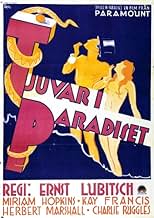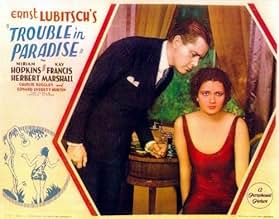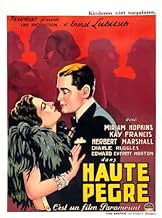AVALIAÇÃO DA IMDb
7,9/10
17 mil
SUA AVALIAÇÃO
Um ladrão refinado e uma gatuna se aliam para aplicar um golpe em uma bela empresária do ramo da perfumaria.Um ladrão refinado e uma gatuna se aliam para aplicar um golpe em uma bela empresária do ramo da perfumaria.Um ladrão refinado e uma gatuna se aliam para aplicar um golpe em uma bela empresária do ramo da perfumaria.
- Direção
- Roteiristas
- Artistas
- Prêmios
- 6 vitórias no total
Charles Ruggles
- The Major
- (as Charlie Ruggles)
Luis Alberni
- Annoyed Opera Fan
- (não creditado)
Hooper Atchley
- Insurance Agent
- (não creditado)
Tyler Brooke
- Commercial Singer
- (não creditado)
Marion Byron
- Maid
- (não creditado)
Louise Carter
- Woman with Wrong Handbag
- (não creditado)
Gino Corrado
- Venetian
- (não creditado)
George Humbert
- Waiter in Venice
- (não creditado)
Perry Ivins
- Radio Commentator
- (não creditado)
Leonid Kinskey
- Russian Visitor
- (não creditado)
Gus Leonard
- Elderly Servant
- (não creditado)
Carl M. Leviness
- Party Guest
- (não creditado)
- Direção
- Roteiristas
- Elenco e equipe completos
- Produção, bilheteria e muito mais no IMDbPro
Avaliações em destaque
Once, "The Lubitsch Touch," was as well known as Hitchcock's reputation as "The Master of Suspense."
"Trouble in Paradise" is Lubitsch's unqualified masterpiece. This pre-code sophisticated comedy epitomizes the European attitude toward sex in its very first scene between Hebert Marshall and Miriam Hopkins. Marshall reveals he has stole Hopkin's garter without her knowing it and she leaps in his lap. She checks -- at the dinner table no less -- realizes it is gone and with the admiration of one thief for another leaps into his lap. "Darling!" she says. No one has to guess what she has in mind, although it is all done with the wit and brio that the "Lubitsch Touch," refers to.
It's great to have this film readily available and the DVD version includes an informative and enlightening commentary (Marshall only had one leg and his lurching walk made a certain speedy cutting necessary that helps give the film it's light, speedy quality).
Lubitsch also made "Shop Around the Corner," remade by Nora Ephron as "You've Got Mail," and "Ninotcha," with Greta Garbo. His musicals with Maurice Chevalier and Jenette MacDonald, such as "The Merry Widow," are also worth seeking out.
"Trouble in Paradise" is Lubitsch's unqualified masterpiece. This pre-code sophisticated comedy epitomizes the European attitude toward sex in its very first scene between Hebert Marshall and Miriam Hopkins. Marshall reveals he has stole Hopkin's garter without her knowing it and she leaps in his lap. She checks -- at the dinner table no less -- realizes it is gone and with the admiration of one thief for another leaps into his lap. "Darling!" she says. No one has to guess what she has in mind, although it is all done with the wit and brio that the "Lubitsch Touch," refers to.
It's great to have this film readily available and the DVD version includes an informative and enlightening commentary (Marshall only had one leg and his lurching walk made a certain speedy cutting necessary that helps give the film it's light, speedy quality).
Lubitsch also made "Shop Around the Corner," remade by Nora Ephron as "You've Got Mail," and "Ninotcha," with Greta Garbo. His musicals with Maurice Chevalier and Jenette MacDonald, such as "The Merry Widow," are also worth seeking out.
Why isn't this film out on Video or DVD? It is a masterpiece of subtlety and wit that has to be out there for people to study and learn from instead of being 'out of circulation.' Can you imagine Chaplin's 'Gold Rush' or 'Modern Times' being out of circulation? No. Well, this is a better overall film than anything Chaplin ever put out and mawkishly undermined with sentimentality, but only film buffs who go to rare screenings get to see it. It is not so much a laugh riot like Chaplin's best bits as it is extremely clever, to the point of being transcendent. Its tone reminds me very much of Jean Renoir's 1939 'Rules of the Game,' and Bunuel's comedies, although it doesn't have Bunuel's 'cruelty' (as master critic Andre Bazin would put it). It is just a work of art which most 'non-artsy' people will dismiss as 'just another clever comedy' because works of art annoy them (and they don't see why they should be bothered with applying the energy needed to understand them), while 'artsy' people will overrate it, and rightly so. Overrated or not, Lubitch's film is a joy to behold; you are glad it exists. As you're watching, you know you're being hit with valuable not-necessarily verbal information left and right. You know it's worth reseeing many times because you will get a different blend of perspectives from it everytime (much like a great piece of music). The essence of what makes it 'great,' as opposed to 'just another comedy' is this: 'Trouble in Paradise' completely destroys harmful romantic myths while affirming true romanticism (think Stendhal, Proust, Lessing, Nabokov) in the very way it is made, its style. This is what it does and it is an extremely important and purifying process for those who go through it and implicitly embrace its implicit principles. But, as it is, nobody'll get to see it anyway because it's not out on video, so what the hell am I writing for? To get all 3 of the people who will read this page in the next year to demand that it be put out for public consumption. Long live democracy!
10AlsExGal
... but you won't find any truly good guys either. It's the charm and sophistication of Lubitsch to deny these things to the audience.
Thieves Lily (Miriam Hopkins) and Gascon Monescu (Herbert Marshall) meet and fall in love in Venice. They then thieve their way across Europe until they hit Paris. They have no compunction about stealing anything from anybody. Part of what turns them on about one another is the stealing. Mariette Colet is the owner of Colet cosmetics. She has apparently inherited this firm from her late husband. She has no real interest in running the place and prefers to spend extravagantly on clothes, furs, and cars. She has no compunction about doing so in hard times. Lily and Monescu decide to steal from Madame Colet since she likes to delegate all of the number crunching work to secretaries, and Monescu charms her into giving him the position. He doesn't intend to embezzle from her. He's just going to clean her out of cash like the conventional thief that he is before he exits the premises.
But during the weeks they are working together Monescu and Madame Colet begin to fall for one another. They are both people of taste and refinement, so they have much in common. So now there is this triangle of which Monescu is painfully aware. Will he stay with Colet and abandon Lily? Will he perhaps spend one night with Colet AND leave with Lily? Colet seems like the type that if it was just one night of passion she wouldn't be upset by that either. Watch and find out.
It's all very sophisticated, and the dialogue is clever from beginning to end. You can feel the sexual tension in the air. Charles Ruggles and Edward Everett Horton play romantic rivals for Colet who weren't getting anywhere with her before Monescu hit town, and now that he's here they blame him for their failure . C. Aubrey Smith is a member of Colet's board of directors who is more than a little suspicious of Monescu.
If you want to see romance played out realistically in an adult fashion, give this film a try.
Thieves Lily (Miriam Hopkins) and Gascon Monescu (Herbert Marshall) meet and fall in love in Venice. They then thieve their way across Europe until they hit Paris. They have no compunction about stealing anything from anybody. Part of what turns them on about one another is the stealing. Mariette Colet is the owner of Colet cosmetics. She has apparently inherited this firm from her late husband. She has no real interest in running the place and prefers to spend extravagantly on clothes, furs, and cars. She has no compunction about doing so in hard times. Lily and Monescu decide to steal from Madame Colet since she likes to delegate all of the number crunching work to secretaries, and Monescu charms her into giving him the position. He doesn't intend to embezzle from her. He's just going to clean her out of cash like the conventional thief that he is before he exits the premises.
But during the weeks they are working together Monescu and Madame Colet begin to fall for one another. They are both people of taste and refinement, so they have much in common. So now there is this triangle of which Monescu is painfully aware. Will he stay with Colet and abandon Lily? Will he perhaps spend one night with Colet AND leave with Lily? Colet seems like the type that if it was just one night of passion she wouldn't be upset by that either. Watch and find out.
It's all very sophisticated, and the dialogue is clever from beginning to end. You can feel the sexual tension in the air. Charles Ruggles and Edward Everett Horton play romantic rivals for Colet who weren't getting anywhere with her before Monescu hit town, and now that he's here they blame him for their failure . C. Aubrey Smith is a member of Colet's board of directors who is more than a little suspicious of Monescu.
If you want to see romance played out realistically in an adult fashion, give this film a try.
Ernst Lubitsch had a tendency towards pushing the boundaries, whether it was the boundaries of the Production Code or the boundaries of one's stomach, as it's splitting from laughing at his films. "Trouble in Paradise" is one hundred percent, absolutely, no exception to this rule. This film has got to be the greatest film comedy of the 1930's (toss up between this and "Bringing Up Baby" ... perhaps??). The situations, the dialogue, the characterizations, the rich sexual undercoating ... FANTASTIC!!!
Gaston Monescu likes to travel incognito, in the shadows likes to hide, unseen like a thief mosquito, if you have something you prize, he will snatch it from your eyes, with his partner by his side, a great combo.
Made in 1932 but just as accessible and as enjoyable all these years later, as a pair of classy villains seek to defraud a wealthy lady of the contents of her safe by gaining her confidence and guiding her in the directions of their deceit. Plans go a little awry as profits are palmed for passions and one of the antagonists loses focus of the bounty, and with Kay Francis as the distraction it's no wonder. Great performances all round from a director who would go on to make some rather impressive films in the future.
Made in 1932 but just as accessible and as enjoyable all these years later, as a pair of classy villains seek to defraud a wealthy lady of the contents of her safe by gaining her confidence and guiding her in the directions of their deceit. Plans go a little awry as profits are palmed for passions and one of the antagonists loses focus of the bounty, and with Kay Francis as the distraction it's no wonder. Great performances all round from a director who would go on to make some rather impressive films in the future.
Você sabia?
- CuriosidadesThe scenes in which Herbert Marshall is running up and down the stairs at Madame Colet's were done with a double who is only seen from the rear. Mr. Marshall lost a leg in WWI and although it was almost impossible to notice that he used a prosthesis, he could not perform any action that called for physical agility.
- Erros de gravação(at around 10 mins) A very clear shadow of a boom mic moves against the wall/screen behind Lily, anticipating her next action (rising and moving toward Gaston).
- Citações
Gaston Monescu: Madame Colet, if I were your father, which fortunately I am not, and you made any attempt to handle your own business affairs, I would give you a good spanking - in a business way, of course.
Mariette Colet: What would you do if you were my secretary?
Gaston Monescu: The same thing.
Mariette Colet: You're hired.
- Cenas durante ou pós-créditosIn the opening credits, the words 'Trouble in' appear and then a bed before the word 'paradise', subliminally indicating that sex is at least part of the film's plot. It was done so subtly for the time that censors didn't notice it until the film's attempted re-release in 1935.
- ConexõesFeatured in Paramount Presents (1974)
- Trilhas sonorasTrouble in Paradise
Music by W. Franke Harling
Lyrics by Leo Robin
Sung by Donald Novis (uncredited)
[Played during opening title card and credits]
Principais escolhas
Faça login para avaliar e ver a lista de recomendações personalizadas
- How long is Trouble in Paradise?Fornecido pela Alexa
Detalhes
- Data de lançamento
- País de origem
- Idiomas
- Também conhecido como
- Trouble in Paradise
- Locações de filme
- Empresa de produção
- Consulte mais créditos da empresa na IMDbPro
Bilheteria
- Orçamento
- US$ 519.706 (estimativa)
- Faturamento bruto mundial
- US$ 928
- Tempo de duração1 hora 23 minutos
- Cor
- Proporção
- 1.37 : 1
Contribua para esta página
Sugerir uma alteração ou adicionar conteúdo ausente

Principal brecha
By what name was Ladrão de Alcova (1932) officially released in India in English?
Responda




































